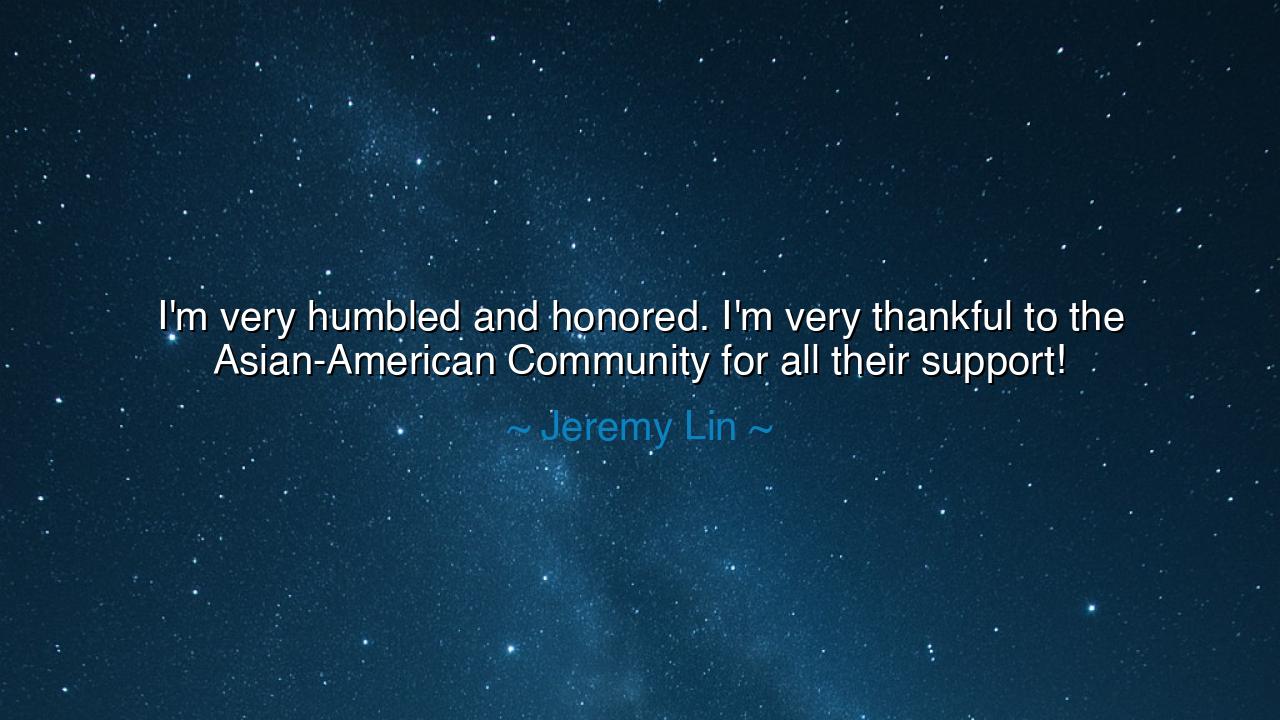
I'm very humbled and honored. I'm very thankful to the
I'm very humbled and honored. I'm very thankful to the Asian-American Community for all their support!






Hear the words of Jeremy Lin, the unlikely hero who carried both his people’s hope and the weight of expectation upon his shoulders: “I’m very humbled and honored. I’m very thankful to the Asian-American Community for all their support!” In these words is more than gratitude—it is the recognition of a bond between individual triumph and collective strength. He does not speak as one who rose alone, but as one lifted by the love and support of a community that saw in him their reflection, their dignity, their possibility.
To be humbled is to recognize that greatness does not belong to oneself alone. The ancients knew this truth, for no warrior fought without his army, no ruler reigned without his people, no artist sang without his listeners. Lin’s words remind us that every victory is shared, every success sustained by others unseen. By declaring himself honored, he teaches us that the applause of the many is not a crown to be worn proudly, but a responsibility to be carried with reverence.
The Asian-American Community, long overlooked and misrepresented, saw in Jeremy Lin a figure who broke barriers on the global stage of basketball. In his meteoric rise, famously called Linsanity, his personal triumph became theirs. He became a vessel of representation, a living symbol of what could be achieved against stereotype and doubt. That is why his thankfulness resounds with such depth—he knew he was not standing for himself alone, but for millions whose stories were rarely told.
Consider the story of Jackie Robinson, the first African-American to break Major League Baseball’s color barrier. When he stepped onto the field, he was not only playing for his own dream but carrying the weight of an entire community yearning for recognition. Robinson, like Lin, was humbled by this role, for he knew the eyes of history and his people were upon him. Yet in facing that pressure, he turned his burden into greatness. Lin’s words echo this same spirit: gratitude not for fame itself, but for the chance to represent something greater than himself.
There is also humility in his open thankfulness. Many who rise to sudden glory grow intoxicated with pride, forgetting the roots that nurtured them. But Jeremy Lin turns back to honor those who supported him, giving credit not only to his own effort but to the encouragement of his people. This is the ancient virtue of remembrance: to honor the source of your strength, to give back with gratitude rather than take glory alone.
The origin of this wisdom lies in the truth that identity is never solitary. We are each branches of a greater tree, nourished by roots that go deeper than we see. To be thankful to one’s community is to acknowledge those roots, to water them, to strengthen the whole. Lin, by his words, shows that even in the height of fame, he has not forgotten the soil from which he grew.
The lesson is clear: no matter how high you rise, remember those who lifted you. Be humbled by your blessings, and thankful to your community. Your victories are not yours alone, but shared with all who walked beside you, prayed for you, and believed in you. Gratitude binds you to your people, and humility transforms success into service.
Practical wisdom calls you to action: reflect on who has supported your journey—family, friends, mentors, communities. Speak your thanks aloud. Give credit where it is due. And when your own victories come, let your words be like Jeremy Lin’s: not boastful, but thankful, not self-glorifying, but humbled. In this way, your success will not only lift you, but also honor the greater body of people who have made your journey possible.






AAdministratorAdministrator
Welcome, honored guests. Please leave a comment, we will respond soon